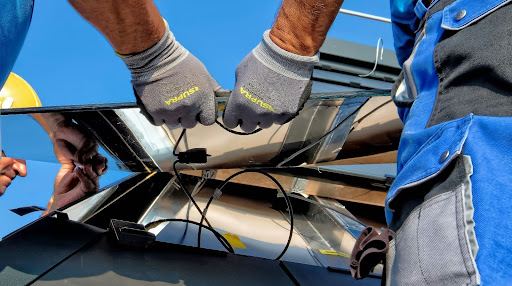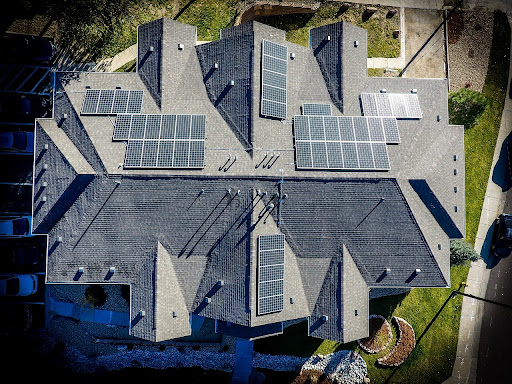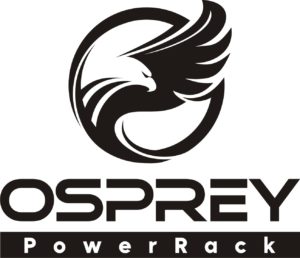Key Takeaways
- Solar panels in Nebraska cost between $7,840 and $22,400 for a typical installation.
- Homeowners can save an average of $53,700 in utility costs over 25 years.
- The federal tax credit can cover 30% of the installation costs.
- Local incentives and utility rebates can further reduce costs.
- Affordable options in Nebraska include Nuance Energy’s Osprey PowerRACK® ground-mount system, which is easy to install and adaptable to various types of soil and terrain.
Solar Panels in Nebraska
While solar panels offer benefits like reduced electricity bills and lower carbon footprints, the decision to install them involves weighing installation costs against potential long-term savings and environmental impacts.
In this guide, we will explain the benefits and costs to help you make an informed decision.
Potential Savings on Electricity Bills
- Solar panels cut your monthly electricity expenses.
- Net metering allows you to earn credits for excess energy produced, which can be used to offset future utility bills.
Impact on Property Value
Besides saving on energy costs, solar panels can enhance your property’s value. In fact, a study by the Lawrence Berkeley National Laboratory found that homes with solar panels tend to sell for about $15,000 more than similar homes without solar energy.
Environmental Benefits
Solar panels provide clean, renewable energy that reduces your carbon footprint – you’re contributing to a healthier planet by reducing reliance on fossil fuels, lowering greenhouse gas emissions, and promoting sustainability.
| Nuance Energy is your superior solution for Ground Mount solar. Our patented foundation technology Osprey PowerRACK® allows for rapid installation using only handheld tools, significantly reducing both time and costs compared to traditional racking systems. This cutting-edge technology works for residential and commercial installations, and Nuance Energy empowers solar installers to take back control of their installation schedules, control project COGS, gain market share, increase the speed of installation, and reduce the cost of labor. In contrast, a traditional ground mount is much more unpredictable, slower, and costly.
Find out how Nuance Energy can accelerate your solar projects with the Osprey PowerRACK® line, and boost your profitability. Contact us today to discuss our innovative ground-mount solutions. |
Cost of Solar Panels in Nebraska

Solar installation costs are largely dependent on your energy requirements and the size of your home or business.
Average Installation Costs
The cost of installing solar panels in Nebraska varies depending on several factors, including the size of your home and energy needs. On average, you can expect to pay between $7,840 and $22,400. This range reflects the difference in system sizes and the complexity of installation.
It’s essential to get quotes from multiple solar companies to find the best deal. Comparing prices and services will ensure you receive the best value for your investment.
For example, at Nuance Energy, we offer our innovative Osprey PowerRACK® ground-mount system, which allows you to significantly cut down on labor and set-up costs due to its easy installation process.
Federal Tax Credit
The federal government offers a significant incentive for homeowners considering solar panels: the Federal Solar Investment Tax Credit (ITC). This credit allows you to deduct 30% of the cost of installing a solar energy system from your federal taxes. However, this percentage is scheduled to decrease in the coming years – so acting sooner rather than later can maximize your savings.
State Incentives and Their Availability
Although the state does not have a dedicated solar rebate program, residents can benefit from net metering policies. Under the state’s net metering program, residents can sell excess electricity back to the grid, receiving credits on their electricity bills.
Local Utility Rebates
Local utility companies in Nebraska may offer rebates for solar panel installations. However, these rebates vary by provider and location. Rebates can further reduce the upfront costs, making solar energy more accessible to homeowners.
Some utility companies may also offer performance-based incentives, rewarding you for the energy your solar panels generate over time. Check with your utility provider to see what options are available.
- Contact your local utility company for specific rebate information.
- Explore performance-based incentives for ongoing savings.
- Combine federal and state incentives for maximum financial benefits.
By taking advantage of these incentives, you can significantly reduce the cost of solar panel installation and increase your overall savings.
| Incentive | Type | Details | Availability |
| Residential Clean Energy Credit | Federal Tax Credit | 30% deduction on solar system costs | 2022-2034, decreasing after 2032 |
| Nebraska Dollar and Energy Savings Loans | Low-Interest Loans | Loans up to $125,000 at low interest rates | Ongoing |
| Net Metering | Utility Program | Sell excess energy back to the grid | Up to 25 kW systems |
| Sales and Use Tax Exemption | Tax Exemption | 100% exemption on solar equipment tax | Ongoing |
Solar Financing Options in Nebraska
Purchasing Solar Panels
Purchasing solar panels outright is a straightforward option that allows you to own the system fully. This option requires a larger initial investment, but it also provides the highest long-term savings. Ownership means you benefit directly from all available incentives and savings on your energy bills.
Using Solar Loans
Solar loans offer a way to finance your solar panel system without paying the entire cost upfront. These loans work similarly to a mortgage or car loan, allowing you to spread the cost over time.
Community Solar Programs
Community solar programs are an excellent option for those who cannot install solar panels on their property. These programs allow you to subscribe to a shared solar array, receiving credits on your electricity bill for your share of the energy produced. Community solar is ideal for renters or those with shaded roofs, as it provides access to solar benefits without the need for personal installation.
Are Solar Panels Right for Your Home?

Your roof orientation, available space, and access to sunlight will determine whether solar is a good energy alternative for you.
Assessing Your Home’s Solar Potential
The first step in evaluating solar panels for your home is assessing the solar potential – this involves examining factors such as roof orientation, shading, and available space. Ideally, your roof should have a south-facing orientation with minimal shading from trees or nearby structures.
If your home has these favorable conditions, you are likely to benefit significantly from solar panels. If not, consider consulting with a solar expert to explore alternative options, such as ground-mounted systems or community solar programs.
Calculating Your Return on Investment
To calculate ROI, you’ll need to consider the initial installation costs, available incentives, and projected energy savings over time.
Most importantly, the payback period—the time it takes for your energy savings to cover the installation cost—will give you a clear picture of the financial benefits. A typical payback period ranges from 7 to 12 years, depending on various factors.
- Determine the total cost of installation, including equipment and labor.
- Subtract available incentives, such as tax credits and rebates.
- Estimate annual energy savings based on your current electricity usage.
- Calculate the payback period and overall ROI.
Why Choose Nuance Energy for your Solar Installation in Nebraska
Investing in solar panels in Nebraska offers significant financial and environmental benefits. With average installation costs ranging from $7,840 to $22,400 and the potential for over $53,000 in savings on utility bills over 25 years, solar energy is a worthwhile consideration for homeowners.
The Federal Solar Tax Credit, local incentives, and affordable options like Nuance Energy’s Osprey PowerRACK® make solar energy a more accessible alternative to consumers. Here’s why you should consider our system:
- Reduced Installation Time and Labor Costs: Our patented earth anchor technology minimizes the need for heavy equipment, allowing installations with handheld tools, which reduces labor costs and accelerates project timelines.
- Scalability and Flexibility: Suitable for both small residential and large utility-scale projects, the system can be deployed quickly, even in challenging terrains.
- No Need for Concrete or Heavy Machinery: By eliminating the need for concrete or pile driving, the system reduces environmental impact, installation complexity, and mobilization requirements, making it faster and more eco-friendly.
- Jurisdictional Compliance and Real-Time Testing: With built-in real-time testing and pre-approved engineering reports, the system simplifies the compliance process across different jurisdictions, making it easier for contractors to secure approvals.
Ready to get started?
Get in touch with our team to learn more about our products and how they can benefit your upcoming projects.
Frequently Asked Questions
How long do solar panels usually last?
Solar panels are designed to be durable and long-lasting. Most panels come with a warranty of 25 to 30 years, but they can continue to produce energy well beyond that timeframe. Over time, their efficiency may decrease slightly, but they will still generate a significant amount of electricity.
It’s essential to choose high-quality panels from reputable manufacturers to ensure longevity and performance.
What maintenance do solar panels require?
Solar panels require minimal maintenance – regular cleaning to remove dirt, dust, and debris is usually sufficient to keep them operating efficiently. In areas with heavy snowfall, removing snow from the panels will help maintain energy production.
Additionally, periodic inspections by a professional will ensure that all components are functioning correctly and address any issues promptly.
Can solar panels increase my home’s value?
Yes, solar panels can increase your home’s value. Homes with solar installations are often more appealing to buyers because of the potential energy savings and environmental benefits. Studies have shown that homes with solar panels tend to sell faster and at higher prices than those without.
What are some affordable options for solar energy in Nebraska?
Nuance Energy’s Osprey PowerRACK® is an affordable, scalable option that allows for more time-efficient installations and lower installation costs for both residential and commercial projects. In addition to alternatives like these, Nebraskans can take advantage of the Federal Solar Tax Credit, which reduces the cost of solar installations by up to 30%, along with state-level incentives.
Save Time & Money on Your Next Solar Project
Request a QuoteRECENT POSTS
- DPW Solar vs Nuance Energy Mounted Solar Options: Cost & Benefits
- Geotechnical Report Cost & Requirements For Solar Projects
- Are Solar Panels Worth It In Nevada? Costs & Options
- OSPREY PowerRack Ground Mount System Compatibility: Single- and Dual-Axis Trackers
- Rammed Earth Foundation For Solar Arrays: Cost, Pros & Cons
- Agrivoltaics Explained: Solar & Agriculture Combined
- Large Scale Solar Systems Options: Pros & Cons
- Best Solar Options For Farms & Agriculture: Cost, Pros & Cons
- Unirac vs MT Solar Mounted Options: Cost & Benefits
- IronRidge vs Grengy Mounted Solar Options: Cost & Benefits

